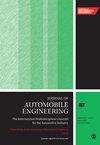汽车车门密封腔在风力激励下产生噪声的特性和机理试验研究
IF 1.5
4区 工程技术
Q3 ENGINEERING, MECHANICAL
Proceedings of the Institution of Mechanical Engineers Part D-Journal of Automobile Engineering
Pub Date : 2024-07-23
DOI:10.1177/09544070241259067
引用次数: 0
摘要
由于汽车车门密封系统内的空腔具有不同的几何形状,因此由风激励引起的空腔噪声表现出复杂的特性,导致噪声机制不明确。为了解决这个问题,我们在全尺寸航空声学风洞中对一辆 SUV 的 B 柱、C 柱和后门的车门密封空腔的声学特性进行了研究。主要目的是探索空腔噪声与车内噪声之间的关系。结果表明,空腔声压级频谱中的峰值成分对车内噪声有很大影响,尤其是靠近汽车内部的空腔。为了进一步了解情况,我们提取了空腔的几何特征,并将其转化为等效的规则空腔。随后,在小型航空声学风洞中对这些等效空腔的噪声性能进行了测试,并对其发生机制进行了深入研究。结果表明,不同空腔的噪声频谱,无论是密封条还是泄漏间隙,都表现出典型的多峰特性,有些甚至会产生啸叫(如后门空腔)。产生啸叫的原因是当空腔的自持振荡频率与亥姆霍兹共振频率或空腔的模态频率重合或接近时产生的共振。有趣的是,即使这两个频率相隔较远,自持振荡频率和空腔模态共振仍然存在,尽管在声压频谱中的峰值较低(例如在 B 柱和 C 柱的密封空腔中)。本文章由计算机程序翻译,如有差异,请以英文原文为准。
Experiment research on the characteristics and mechanism of noise caused by a car door sealing cavity at wind excitation
Due to the various geometric shapes of cavities within car door sealing systems, the resulting cavity noise induced by wind excitation exhibits complex characteristics, leading to unclear noise mechanisms. To address this, a study was conducted to examine the acoustic properties of door sealing cavities located in the B-pillar, C-pillar, and backdoor of an SUV within a full-scale aeroacoustic wind tunnel. The main objective was to explore the relationship between cavity noise and interior noise. The results showed that peak components in the sound pressure level spectrum of the cavities significantly contribute to interior noise, particularly for cavities located close to the car’s interior. To gain further insight, the geometric characteristics of the cavities were extracted and transformed into equivalent regular cavities. These equivalent cavities were subsequently tested for their noise performance in a small-scale aeroacoustic wind tunnel, and the occurrence mechanisms were thoroughly investigated. The results demonstrated that the noise spectra of different cavities, whether they had sealing strips or leakage gaps, exhibited typical multipeak characteristics, with some cases even leading to whistling (e.g. backdoor cavity). The reason for the whistling was a resonance when the self-sustained oscillation frequencies of the cavities coincided with or approached the Helmholtz resonance frequencies or modal frequencies of the cavities. Interestingly, the self-sustained oscillation frequency and cavity modal resonance still persisted even when the two frequencies were somewhat separated, albeit with peaks of lower magnitude in the sound pressure spectrum (e.g. in the sealed cavities of the B-pillar and C-pillar).
求助全文
通过发布文献求助,成功后即可免费获取论文全文。
去求助
来源期刊

CiteScore
4.40
自引率
17.60%
发文量
263
审稿时长
3.5 months
期刊介绍:
The Journal of Automobile Engineering is an established, high quality multi-disciplinary journal which publishes the very best peer-reviewed science and engineering in the field.
 求助内容:
求助内容: 应助结果提醒方式:
应助结果提醒方式:


